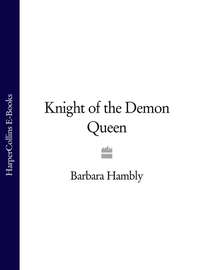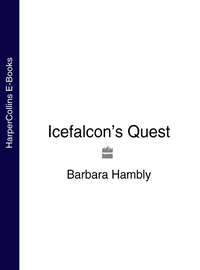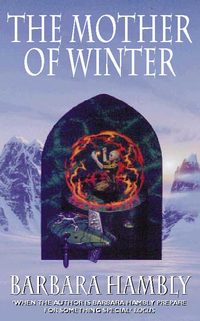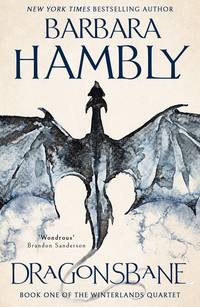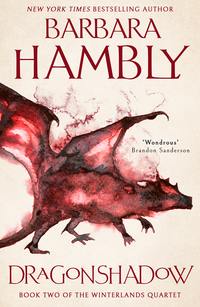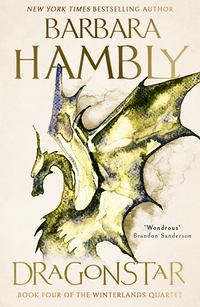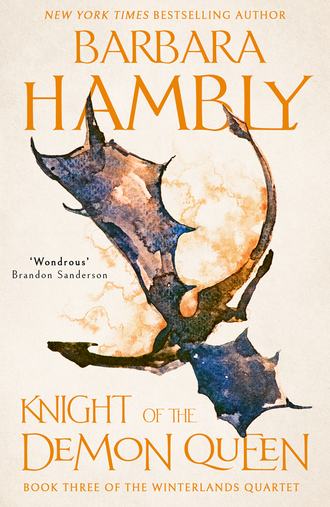
Полная версия
Knight of the Demon Queen
She saw John’s eyes looking at her across Ian’s body and wanted only to sleep again.
Snow had piled thick before the house door. She made herself get up and slipped through a tiny passway from the kitchen that let her into the stable. There she fed Moon Horse and mucked out her stall, her numb hands crooked as bird claws around rake and hay fork. The effort exhausted her, and without eating or washing—it seemed too much effort even to boil water for gruel—she returned to her quilts and the comfort of her dreams.
All care for her life seemed to have dried with her menses. The symptoms she had once kept at bay with her spells returned to tear at her, so she could not rest. Blind with migraine, she crept about her few tasks like an old woman, feeding the fire and boiling a little snow water to drink.
In her memories Amayon was still with her. Magic flowed in her veins.
Let your magic go, Morkeleb had said to her, Morkeleb the Black, the dragon of Nast Wall.
Let your magic go.
She hadn’t known then that it would not come back.
In her dreams she saw him, beautiful beyond beauty: the black glittering specter in the darkness of the gnomes’ Deep at Ylferdun, the cold voice like the echo of far-off singing that spoke in the hollows of her mind. Know you not your own power, Wizard-woman? he had asked her once. Know you not what you could be?
And later, when he had begun to change, to become a dragonshadow of smoke and starlight: I would that I could heal you, my friend, but this is not possible: I, who destroyed the Elder Droon and brought down the gnomes of Ylferdun to ruin, I cannot make so much as a single flower prosper when frost has set its touch upon it.
She saw him again, as she had seen him last: near invisible, beautiful, a ghost of peace and stillness, flying away to the North. Not sleepy dreams, she thought, but clarity, an acceptance of time and change.
Waking, she felt still the deep peace of his presence. Wind screamed around the walls and in the thatch, and the cold draft streaming from the attic reminded her that in summer she’d gathered herbs and dried them on the rafters, herbs to ease the ill of other women’s change: primrose and pennyroyal and slippery elm.
She worked the door open enough to scrape some snow into a pan, which she put on the hearth to boil. She wedged herself through the cranny to the stable and pitched fodder for Moon Horse again and cleaned her stall, shivering in the colder atmosphere of the stable but glad to have the care of another creature to occupy her thoughts. Returning to the kitchen, she checked the water, touched a candle to the flame, and dragged herself up the attic stairs.
It was cold up there. The window through which she’d watched John depart three days ago was unshuttered, cold seeping through the glass as if there were nothing in the space at all. No light trickled in with the cold—Jenny had no idea what time it was. With the wind rising and dense cloud covering the stormy sky, it could have been dawn or twilight or midnight. Her candle glow touched the herbs, homey comforting bundles, like an upended forest over her head.
Yet there was something wrong. Jenny stood, candle in hand, listening, trying to sense what exactly it was.
Her dream? she thought. Folcalor?
She had the sense of having had another dream, or some other awareness while she dreamed—eternally and repetitively—of Aohila, of Amayon, of John’s betrayal. Closing her eyes, she walked back in her mind to the mirror chamber, as she’d seen it in her dream, and it seemed to her for a little time that she could hear something else, some voice whispering …
It seemed that as she stood in the mirror chamber, looking at John in his flame-scarred and grubby doublet with the fourteen prisoned Sea-wights around his feet, someone or something was standing behind her. Someone that she knew with a hideous intimacy.
Someone who had hurt her and had laughed at her while she wept.
She knew if she turned around she would see him—it. And the sight would destroy her, because the horrible thing she would see would be herself: a woman capable of causing her own child’s suicide, a woman who had betrayed the man she loved a thousand times.
Go downstairs and dream again by the fire.
You do need to rest.
In that mirror chamber in her heart she turned around. And of course there was nothing there but shadows.
She opened her eyes. Her single candle flame bent and flickered in the draft, the heavy rafters she had known since girlhood taking on sinister weight and darkness overhead. There was a bundle of candles under the spare bed, candles she’d made five summers ago, and she took half a dozen and lit them, looking carefully around her for any sign of the wrongness she felt.
But the light seemed to dispel whatever it was that had troubled her. The room was as it had always been: a big open space beneath the tall slant of the thatch. Spare bed, bundles of candles, bags of dried corn and barley spelled a year ago against mice. Blankets and quilts and old coats, snowshoes and boots. The sense she had had, of wrongness and evil, seemed to have folded itself away into a shadow.
And maybe a shadow was all it had been.
Storm winds smote the house, and all the candle flames bent and jittered with it. More snow, Jenny thought.
But the thought didn’t bring with it the urge to sleep again, merely a reflection that with her hands twisted as they were, it would take longer to wield the shovel to dig herself clear. She opened the window long enough to pull the shutters closed and bar them, then made her choices among the dried herbs, gathering the little bundles and holding them in her skirt. As an afterthought she looked for a clean skirt, a clean shift, a clean bodice from the chest of spare clothes, then went downstairs to tidy the kitchen.
Behind her she thought the shadows whispered, but she did not look back.
THREE

JOHN’S STUDY WAS a round chamber at the top of the tower that in his father’s time had doubled as a depot for emergency food stores and a lookout post in bad weather. Wide windows faced the cardinal points and made the place almost impossible to heat. As a child, John had fallen into the habit of studying there, away from his father’s eye, and hiding his books among the grain sacks.
Now a lifetime’s plunder of learning stacked desk, worktable, and the plank shelves that filled every available inch of wall space. Candles—or the slumped, exhausted remains of them—sprouted like fungi among the dilapidated volumes, stalagmites of tallow bearding every shelf, corner, and lamp stand. Scrolls, parchment, piles of papyrus drifted every horizontal surface like dried leaves. The rafters were a spiderweb of experimental hoists and pulleys, the shelves a ramshackle graveyard of disemboweled clocks. A telescope, built by John according to accounts he’d found in a volume of Heronax, stood before the eastern window, the gnome-wrought crystal lenses pointed at the quadrant of the sky where six hundred years ago Dotys had predicted the rising of a comet at last summer’s end.
Unerringly John picked from the disarray an onyx bottle that had once contained silver ink. Terens had described such a thing in Deeds of Ancient Heroes in writing of the villainous Greeth Demoncaller, who had been dismembered alive on orders of Agravaine III. John tied a red ribbon around it—why red? he wondered—and put it in his pocket. From a cupboard he took five new candles—marveling a little that he could find five unburned—and Volume VII of Gantering Pellus’ Encyclopedia and finally, from the litter of the desk, a piece of black chalk.
Gantering Pellus strongly recommended that experiments concerning demons not be conducted under roofs that would ever again shelter humans. In fact, he’d strongly recommended that such experiments not be conducted at all. For whoso speaketh with the Spawn of Hell, even in their dreams, the encyclopediast wrote, is never after to be trusted in any congress with men. It is the whole art and pleasure of such wights to cause suffering. They are cunning beyond human imagining and, being deathless, will stay at nothing to avail themselves of access to the affairs of men.
All of this, John reflected as he climbed from the tower, was true.
As true as fever, and love, and duty, and death.
He fought his way through the snow to his work shed. His hands could barely work the catch on the door. Drafts tore at the flame as he hung his lantern on a low rafter, shadows jittering among the bones and sinews of his larger experiments: the clockwork engine of his flying machine, the webby drape of the parachute that had cost him a week in bed with a broken collarbone the summer before last. Trying not to think of anything beyond the moment, he cleared the wheels and gears of the dragon-slaying machine away from the center of the room and with the black chalk drew a pentagram on the dirt floor.
Let the flame be virgin as the waxe, the encyclopediast said of the candles. Their wobbly light threw his shape huge on the rough-cast walls. He placed the ink bottle beside him and settled himself cross-legged in the pentagram’s center, breathing deep.
He had none of his son’s magic, none of the power Jenny had lost. By all rights, he thought, as the fivefold candleflame bent and shivered, the world should have no more to fear from what I am doing than from a child’s game.
But his heart felt as if it would break in his ribs with pounding, and his whole body was cold.
“All right,” he said into the silence. “You win. What do you want?”
Once on a time, staring into the fire, Jenny could have seen them.
Seen Ian sleeping—in the room he shared with Adric? In the great bed she’d shared with John? Did Aversin sit beside his son, awake or asleep?
Jenny closed her eyes, the ardent changefulness of the flame a color visible yet. But the images she saw in the dark of her mind were only those created by her thoughts.
Ian sleeping, as she’d seen him sleep a thousand times.
Low red firelight playing over the strings of her harp in its corner. Her hands were too stiff with scars now to coax music from its strings.
John …
Where would he be? And what would he be doing, in the wake of his son’s attempt to take his own life?
She shivered, remembering him clinging to the spikes and horns and hammering wings of two dragons as they fought hundreds of feet above the ground, trying to reach his son with the talismans he’d bartered his soul to get. She remembered herself riding the black dragon Morkeleb down into the sea in pursuit of Caradoc as he fled, and she saw again the distorted demon fish circling and attacking in the blue-black water as she and the dragon drove Caradoc back among the coral and rock. She saw the devil light streaming from the old mage’s open mouth, his open eyes, the smooth white moonstone in his staff’s head.
The water had burned her as she pinned the renegade wizard’s body to the rocks with a harpoon. She had pulled the crystal spike from the dragon Centhwevir’s skull, freeing Centhwevir of the demon. She’d torn away from Caradoc’s neck the silver bottle containing the jewels that imprisoned the captive wizards’ souls. But Folcalor had rushed forth out of Caradoc’s body, leaving the wizard’s emptied corpse to be devoured by fish.
Later, when they’d returned the souls of the wizards to their bodies again, they’d found among the jewels in the bottle a topaz that they’d assumed contained Caradoc’s soul. This they had smashed—as they’d smashed that of the Icerider boy Summer, whose body had been killed in the fighting—to release the soul into the next world.
Now, as she tried vainly to call John’s image in the fire, all she saw was that underwater darkness, that blue-black world near the Sea-wights’ abyss. The whalemages had closed the demon gate by piling rocks before it. Closing her eyes and letting her mind drift, Jenny did not know whether what she saw was in truth a scrying or only the pictures in her imagination.
But she smelled the cold salt strangeness of the deep sea and heard the movements of the water around the black columns of rock where Caradoc had been pinned. Like vast moving shadows she saw the whalemages above her, and far below, silver stealthy shapes whose eyes flared with green light.
“A knight went out on errantry,
Sing the wind and the rain …”
The song seemed to come from a great way off. Children singing, he thought, as Ian had sung to Adric when they were small. Thin frail voices down a long corridor of darkness.
“A knight went out on errantry
In shining silver panoply,
And none could match his gallantry,
Sing the wind and the rain …”
The air in the room changed. He smelled sulfur and scalded blood.
“Sing the wind and the rain.”
She was there, in the shadows near the western wall.
John drew breath, queasy with fear.
He knew he was asleep. The quality of the candlelight and the way the darkness in the work shed vibrated with colors unknown to waking sight told him this, along with the fact that he felt only vaguely cold although he could see his breath. Looking hard at the shadows he couldn’t see her. Things that appeared one moment to be her turned out the next to be only pale shapes in the plaster, or shadows thrown by an engine’s pulleyed wheel. It was worse than seeing her, because he couldn’t imagine what form she wore.
“You said you wanted aught done, an’ all.” It took him everything he could muster to speak. “What is it you want, that you’ll kill half me people to get?”
Her chuckle was like a torturer’s little silver hook slipped down a victim’s throat. “My darling, I’d kill half your people for the amusement of hearing you weep for them. You know that.”
He made no answer. Droplets of blood began to ooze from the coarse plaster wall, glistening in the five candles’ light. The smell of it went through his head like a copper knife.
“It isn’t much that I want,” she purred in time. “I’m not an ogre.” She spoke, he saw now, out of a running wound that opened in the wall. The voice came out with a clotted trickle of blood, nearly black in the flickering shadows. He wanted to look away but couldn’t.
“But there are things a man can do, and places a man can ride, that the Hellspawned cannot. The world is differently constituted than you think, Aversin.”
Still he said nothing. Storm wind had been howling around the Hold walls, and he could not imagine that it had ceased to do so, but the work shed was silent as if it had been plunged to the center of the earth.
“When you passed through the burning mirror this summer past, you entered Hell.” Like a dragon she spoke into his mind, placing images there. He saw himself pasting the gnomewitch Mab’s sigil on the enamel that covered the mirror’s unholy glass, felt the cold, burning touch of the Demon Queen’s mouth on his. The horrors of illusory death, illusory pain, as if he were dreaming within a dream about being tortured and killed, without the ability to wake up.
“But there are other Hells,” she went on. “The Hell of the Sea-wights, whence the Archwight Adromelech sent Folcalor to trap the mages and the star-drakes, is not the Hell of my Realm. All Hells are not alike. Nor are all demons, and in some Hells it is deadly for the demonkind to tread.” These images passed beyond his ability to picture them: only suffocation, dread, and the promise of horrible pain.
“You’re goin’ to give me a couple of coins, then, and a little basket and send me to market?” His mouth was dry. He couldn’t imagine a place where the thing he spoke to would fear to enter. “For what?”
“Only water.” Her voice was as casual as a child pretending disinterest in a coveted toy. He saw it in his mind even as she spoke of it, if she did speak. “There’s a spring in the mountains there, where the rocks are silver and red.” It felt as if he were recalling something once visited, or known long ago and forgotten. “Its water has a virtue against the demons who dwell behind the mirror. It is a grievous life, to be Queen of Hell.” Her lovely voice grew sad.
“Demonkind are fractious and divisive, ignorant of their own best good. There have been attempts to unseat me, to devour me, by those who should thank me for the steady strength and kindness of my rule.” He remembered her tearing the head off a small wight and throwing it aside, then continue speaking to him with gore dripping from her chin.
“The Hell to which I will send you is inimical in many ways to us and our kind. Some of our spells continue to work there, but many do not. This water is a weapon I need to maintain my power. But you understand that I cannot fetch it myself. Nor can any of those loyal to me go there.”
“Yet you trust me.”
She smiled. He could not see her—could see nothing but the stream of black-red running down the wall—yet he could feel her smile. “John.” Almost he could feel the touch of her cold hand on his hair. “You know what I can do.”
She had tried to trick him once into paying for the spells against Folcalor’s Sea-wights with a thunderstone, meteor iron whose origin—being extraterrestrial—was not affected by the magics of the world because those magics knew nothing of its origins. At least that was what Jenny and Morkeleb had said. Rightly, the gnomes had refused to part with one. With the thunderstone she could have wrought a gate into the world of humankind that could not be closed by human magics and probably, like the burning mirror that was framed in meteor iron, couldn’t be destroyed.
Was the water the same? If she’d ruled the spawn of the Hell behind the mirror for countless thousands of years, it was likely she was perfectly capable of carrying on for another few millennia, water or no water. Or were these new and stronger demons a threat to her as well?
His hands felt cold, and he stared at the flowing wound in the shadows, wondering how to get himself out of this alive. He was far beyond anything he had ever read in Dotys or Gantering Pellus or Polyborus, far beyond the craziest hints of dreams or magic or madness.
And if he guessed wrong, he knew, people would die. Muffle or Aunt Rowe or any of a hundred others whose lives had all his days been his charge. Ian or little Maggie, his and Jenny’s youngest child. Adric or Jen herself.
“And I can just sashay on into this Hell with me little bottle and fetch you this water, then?” He pushed up his spectacles again and scratched the side of his nose. “Nobody’s goin’ to ask me what I’m doin’ there?”
“Naturally,” she crooned, “I will not send you on your errantry naked. You will know the way from the place where the gate is to the spring in the mountains. And you will have a helper to advise you.”
“I can hardly wait,” he said.
And a wind blew the candles out.
Dreams opened, windows into windows in his mind. In his dream he had been walking for hours and days, weeks maybe, in a bleak stony country where nothing grew but tufts of herbage in crevices. The rock was carved and twisted into waves, caverns, combers, dragons, and razor-edged ridges as if by violent winds, but he felt no wind. Sun hammered on its silver-threaded rusty glassiness. In pools he saw asphalt bubble and drip, but he felt no heat, nor did the steam that rose from the deep clefts have any smell. He came down out of the rock mountains to a maze of dry gullies, sandy flats, and knots of black, wasted trees among gouged walls of rock and earth. He saw the dust scamper, the black trees bend and shake.
He was a naturalist and a tracker. He could call to mind every foot of the Winterlands, every root and rock and trail. That was what it took to stay alive in his land. Looking around him now he made note of the shape of the land—the notches and ridges that would let him climb to the higher red-and-silver peaks where, he knew, the spring would lie.
Later still he was beside water and made note there, too, of the windings and changes of the riverbed. Lake flats lay near, speckled with humped gray silent plants barely poking their heads above the surface.
In this place he saw no life, but something told him that life was there.
In one hand he held the onyx ink bottle on its long red ribbon. In the other, three flax seeds, like little black beads in his ink-stained palm. The ink bottle was unstoppered and empty, though he had the stopper with him, too. Holding both was awkward, so he put the flax seeds in the bottle.
At once smoke began to coalesce from the dry air around him. He heard a voice cursing him, foul and furious. The smoke poured into the bottle, and he felt the onyx turn hot in his hand. He stoppered the bottle. The cursing stopped—or, in the ensuing silence, could still be heard muffled and tiny from within the bottle—but the bottle itself was warm, like bread new-taken from the oven.
You will have a helper to advise you, he heard the Demon Queen’s voice say again. Looking down, he saw a little puddle of blood on the dark rock at his feet. The words came out of that. He shivered, knowing what kind of a helper it would be.
Let him who has trafficked with demons, and bought and sold whatever of money or goods to them, for any reason whatever, be burned alive on a pyre of dry wood soaked with oil, and all those goods with them, Polyborus had said.
Let him who has summoned demons through a gate into this world be cut into pieces alive, and those pieces afterward burnt, not leaving so much as a finger unconsumed by the fire.
Let him who has willingly taken a demon into his body be cut to pieces and burnt, and the ashes mixed with salt and silver and cast into the sea, that nothing of his substance may afterward be used by the Hellspawnedkind.
Let him who has gone through the gates into Hell be burned, upon dry wood and a hot fire, and bound with chains rune-warded to hold demonkind, for it must be assumed that any man who goes into Hell comes back changed in his body and his soul, if indeed it is the same man, and not merely a semblance of him, who emerges.
For there is no lawful reason for humankind to touch, or speak to, or have traffic with the Hellspawnedkind. Rather should that man perish, and suffer his wife, or his son, or his goods all to perish utterly, than that demons be given a gate into this world.
John knew the words. He’d read them a dozen times over fifteen howling winters, back when he’d only sought knowledge for knowledge’s own sake. He’d read them a hundred times since his return with Jenny from the South, seeking desperately for an answer to Jenny’s terrible silences, to Ian’s debilitating grief.
He woke suddenly, lying on the dirt floor with the late winter dawn oozing leaden through the cracks in the shutters, the stink of burned tallow heavy on the air. Of the five candles only long winding sheets of brown wax remained. The pentagram could still be seen, scratched into the floor. The air smelled faintly of blood, though no trace of it showed on the walls or the floor. John found he could not look at the place on the plaster where the wound had been.
He sat up shivering, aching in his bones and in his heart. Outside he could hear Bill the stablehand talking to Aunt Umetty, with the scrape of a shovel on the ground.
“… broke around midnight,” Bill was saying, “and she’s been sleepin’ natural ever since.” Snow scrunched, fell. The air was iron cold. “They tell me Genny Hopper’s boy’s better, too, though they sure thought he was a goner; even them spots are fadin’ off him. I thought sure, it has to be either Master Ian or Mistress Jenny, and not meanin’ to slight the boy I hoped it was Miss Jenny, since I hear she’s been unable to do spells as she used …”


